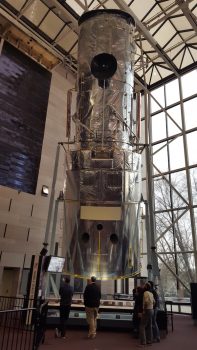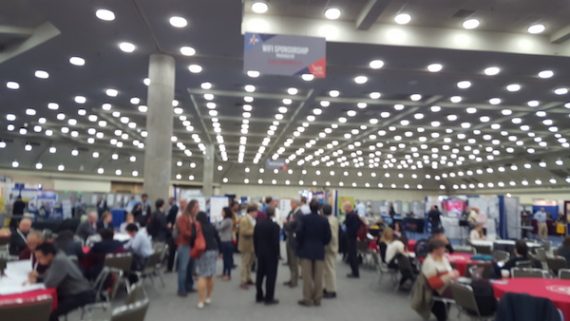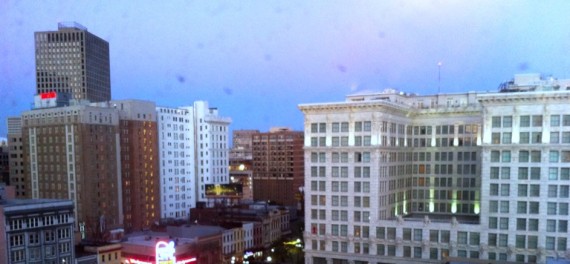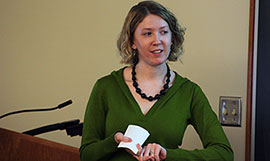The following post is by Katie Mason ’16. Mason used part of her AMS grant to visit the American Physical Society March Meeting in Baltimore, MD in an effort to explore the different concentrations within the world of physics.
As a senior in my final semester, I often get asked the question, “What are you doing next year?” It’s a question that is never far from my mind. I am a Physics major with two research experiences under my belt, so graduate school seemed like the obvious path. I love my field. I love being able to explore everything from the smallest particles to the largest galaxies. The problem is, since Physics is so large, I am having a lot of trouble narrowing my focus to a specific concentration. In all honesty, it is not the worst problem to have. I enjoy many of the fields and find them fascinating. However, I noticed while starting my applications that most schools want their students to have some sort of idea about what they will want to study.
I decided I had to do more research into the different concentrations within Physics. There is no better place to do this than the American Physical Society March Meeting. This yearly conference is one of the biggest Physics conferences in the country, and it was held in Baltimore this year. My goal at this conference wasn’t to present, but rather to absorb as much as I could and hopefully sort more through my options for the future.

Hubble Space Telescope
I took advantage of the conference’s location and spent the weekend before in Washington D.C to go to the Smithsonian Air and Space Museum. It was amazing to see all of the rockets and planes up close. I spent an entire day wandering through the exhibits. Some of the highlights for me were the model of the Hubble Space Telescope (complete with solar panels), one of the Wright Brothers’ planes, and a planetarium show about dark matter narrated by Dr. Neil deGrasse Tyson.
Upon arriving at the actual conference, I was at first struck by just how many people attended. I was also overwhelmed by how many presentations there were. Each day was split into three hour session and each session had around 25 short talks. There were also a few longer presentations. My first day, I decided to play it safe by only attending events marked as undergraduate friendly. The first talk I went to was in the session entitled “Physics of Epidemics” given by Charles Macal from the Argonne National Laboratory. In it, the speaker discussed computer modeling techniques and how they can be used to model and predict future epidemics. I found it fascinating as I have enjoyed computer modeling I have done in my research at Colgate. I also loved the interdisciplinary nature of the work. Though the primary researcher was a physicist, he emphasized his collaboration with biologists and public health workers.

Main Exhibit Hall
Physicists are often viewed as being isolationists and are not known for their work with other fields, so it was very refreshing to see all of the interdisciplinary talks throughout the week. Some of the other sessions included physics and cancer research, the statistical mechanics of social systems, and robotics for use in archaeology. For me, these talks were the highlights of the week, as they showed many broader applications of physics that I haven’t been exposed to before.
I believe I ended my trip feeling even more passionate about physics as a whole. I also have more of a direction now, I will hopefully use the skills I am learning in physics, especially computer modeling and data analysis, and apply them to problems not often associated with physics. It was a very worthwhile experience and gave me a clearer picture of what I would like to research as I enter graduate school. I am continuing on to Tufts University in the PhD track where I will hopefully join a research group in the field of Condensed Matter Physics that also makes use of computer modeling for theoretical predictions.




